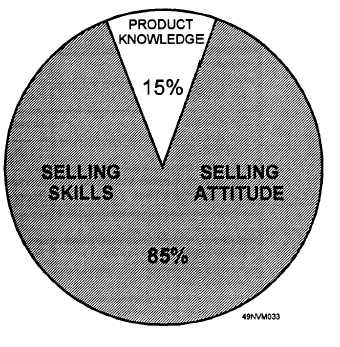| |
LACK OF CARE. – The other characteristic that can
cripple your recruiters is a lack of care. Recruiters who
do not take care of themselves and their belongings can
turn off prospective buyers. Be alert to recruiters who
fail to maintain their health or have a tendency to
complain about it often. Constantly sneezing or
coughing during phone calls can ruin phone power.
Unsightly appearance, such as dirty hair or nails and
disheveled uniforms, can also be a crippler. Take note
of recruiters’ surroundings. Is their desk clean and free
from clutter? Are the government vehicles they drive
maintained and cleaned regularly? A little care can go
a long way in establishing a professional image.
THE SCIENCE OF SELLING
The science of selling can never be an exact one.
There are, however, certain attributes that we know can
lead to success. What characterizes a truly professional
recruiter as
opposed
to the nonprofessional?
Professional recruiters think of their prospects first, last
and always. They build their circle of success from their
product knowledge, selling skills, and selling attitude.
Above all, they have a positive mental attitude. Let’s
take a closer look at the circle of success and positive
mental attitude.
The Circle of Success
The circle of success, shown in figure 6-6,
represents 100 percent of a recruiter’s success potential.
As you can see in the figure, product knowledge
accounts for only 15 percent of that potential. The other
85 percent is made up of selling skills and selling
attitude. Many recruiting leaders will tell you that
selling attitude should actually represent over half of the
circle of success. Product knowledge, selling skills, and
selling attitude are the attributes of a professional
recruiter.
PRODUCT KNOWLEDGE. – Recruiters should be
savvy on Navy programs and opportunities. New
recruiters, especially those with a relatively short time
in service should compile a fact sheet or notebook to
remind them of some of the basics of Navy benefits.
Figure 6-7 provides an example of a desktop reminder
sheet recruiters can use. It is not intended to be used as
an applicant handout.
SELLING SKILLS.– Knowing how to sell is not
enough by itself. Recruiters also should understand the
why and when for each step of the sale. Later in this
chapter we delve into the specifics of the interview
Figure 6-6.—The circle of success.
process.
SELLING ATTITUDE.– A selling attitude includes
the recruiters’ attitudes about themselves, others, and the
job itself. A selling attitude is the most important
ingredient in the circle of success. You probably
remember prospects that joined the Navy though you
barely discussed Navy opportunities. They joined
because of your attitude. Not only will the right selling
attitude contribute to your recruiting success, it will also
contribute to your personal quality of life. By the right
selling attitude, we’re referring to a positive mental
attitude (PMA).
Positive Mental Attitude
We’ve all heard about having a PMA, so, what
exactly does that mean? PMA is the belief in your
ability to do the job well. PMA is the result of
enthusiasm and confidence.
ENTHUSIASM.– Enthusiasm is a must for sales.
Enthusiasm comes from knowing your product and
believing that your product will truly benefit your
prospect. This knowledge and belief makes recruiters
want to go out and show every prospect how the Navy
can benefit them.
CONFIDENCE.– Confidence comes from a
combination of technique and analysis. Technique
6-21
|

